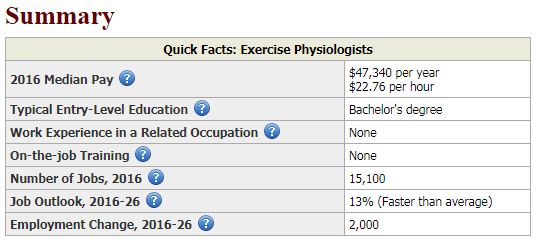Planning on Becoming an Exercise Physiologist? Here are some of the Things You Should Know
 Do you love coming up with various exercise and fitness programs and dream of being a part of the health care industry one day? Then it’s a good idea for you to consider becoming an exercise physiologist.
Do you love coming up with various exercise and fitness programs and dream of being a part of the health care industry one day? Then it’s a good idea for you to consider becoming an exercise physiologist.
Also sometimes known as a kinesiotherapist, a career in this field might enable you to care for patients who are recovering from all sorts of diseases and physical disabilities. People who need the help of a kinesiotherapist might benefit tremendously from carrying out different types of exercises to help improve their overall health and physical condition.
If being an exercise physiologist is on the top of your to-do list, continue reading. Below you will learn more about this exciting job description.
What Is an Exercise Physiologist?
Put simply, an exercise physiologist is a professional in the healthcare industry who has the knowledge and skills to be able to plan, develop and implement fitness and exercise programs. The plans carried out with the help of an exercise physiologist might be advantageous for patients who are trying to bounce back or suffer from medical conditions such as stroke, peripheral neuropathy and obesity, including chronic ones such as Parkinson’s disease, multiple sclerosis and cerebral palsy.
A professional in this job might be somebody who has the ability to design programs for individuals who are trying to improve proper muscle flexibility, joint movement and even body composition, such as those who suffer from physical injuries due to accidents.
Exercise Physiologist vs. Physical Therapist

You are probably wondering: what makes an exercise physiologist different from a physical therapist? Well, at first glance it seems like the two are doing the same jobs. However, there are differences between the two, and knowing them might make it easier to pick which profession you are most interested in.
An exercise physiologist is someone who utilizes exercise and fitness in order to help patients attain much-needed relief from the various symptoms they are experiencing. He or she might concentrate on improving or alleviating through planned and structured physical activities that are carried out over and over again until the expected results have been attained.
On the other hand, a physical therapist is a professional who assist patients in improving or restoring movement as well as managing pain through various techniques, from exercises, massages to the use of ultrasound and other tools.
There are many other experts in the health care industry that an exercise physiologist can be easily confused with, from athletic trainers, fitness instructors, sports and rehabilitation therapists (or what some might mistakenly refer to as sports physical therapist), to recreational therapists. Some of the similar professions might include:
- Physician assistant
- Athletic Trainer
- Physical Therapists
- Occupational Therapist
- Recreational Therapist
- Respiratory Therapist
- Nuclear Medicine Technologists
Various Duties Carried Out

Just because an exercise physiologist specializes in planning, developing and implementing fitness and exercise programs doesn’t mean that those are the only things that he or she might do while at work.
Actually, he or she might need to perform other tasks, too. For instance, an exercise physiologist may need to analyze the medical history of a patient in order to determine which exercises are applicable or can be beneficial. There are various tests that he or she might need to carry out to assess the fitness level and various needs of a patient.
An exercise physiologist might also use numerous pieces of medical equipment to obtain pertinent data such as the blood pressure, heart rate, heart rhythm, among many others.
Qualities an Exercise Physiologist Should Have

Clearly, there are plenty of things that an exercise physiologist has to perform while at work. Because of this, it might be helpful for a member of the health care industry to possess certain traits or characteristics.
For one, he or she might benefit by being detail oriented due to the fact that there are various key health indicators to take and record, as well as medical histories to consider. The person might also benefit from being an excellent decision maker. Anything that he or she decides may have a direct impact on the recovery or improvement of a patient. Because an exercise physiologist works not only with his or her patients but also oftentimes might coordinate with doctors, surgeons, and even the family members of patients, he or she might also need good interpersonal and communication skills.
How to Become a Physiologist

If you are looking to become an exercise physiologist, it’s important that you have the proper education and training.
Depending on your local requirements, you may need to successfully complete a bachelor’s degree that could include coursework related to health and science such as anatomy, biology, nutrition and of course kinesiology. You might also need to have clinical experience.
In the US, you will want to find out if your state requires a license to practice as a Physiologist. Different states might require individuals to take and pass licensure examinations.
There are various certification programs available for today’s exercise physiologists, enabling them to considerably widen and hone their knowledge and skills. A number of these programs might require applicants to pass exams and undergo supervised clinical experience for a specified number of hours.
Job Opportunities for an Exercise Physiologist

The size of this occupation was about 15,100 in 2016 with a median pay of 47,340 a year (22.76 hourly), according to the Bureau of Labor Statistics. Career opportunities for exercise physiologist are expected to grow 13% between 2016 – 2016.
Ready to Start a New Career?

If you’re interested in starting a new career let Fremont University help. We have a number of programs such as Sports & Rehabilitation Therapy, and Massage Therapy to name a few. Contact us today by filling out the contact form to learn how you can get started.
*In no way does Fremont University promise or guarantee employment or level of income/wages.

